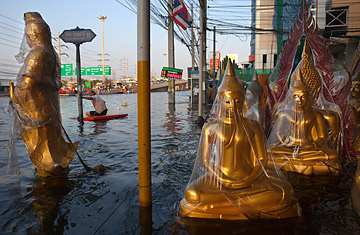
Floodwaters reach a shop selling statues in Bangkok on Oct. 24, 2011
Thailand's King Bhumibol Adulyadej asked late Thursday that no special measures be taken to protect royal palaces from advancing floodwaters, as the deluge pressed closer to the heart of the capital. The military, meanwhile, promised to deploy 50,000 soldiers around Bangkok to try to divert water and help with evacuations. Regional officials have already urged Bangkok residents to leave the city for their own safety this weekend, when high tides and a surge of water from northern provinces are expected. Many residents have already left, leaving Bangkok's famously clogged roadways nearly empty.
Floodwaters were already knee-high outside the Temple of the Emerald Buddha and the old Grand Palace on the banks of the Chao Phraya River on Friday morning. Several old temples and palaces line the river that snakes down from the inundated central provinces, through the capital and out to the Gulf of Thailand. In Nonthaburi, just north of the city, Buddhist monks and residents at a riverside temple caught one of dozens of crocodiles that escaped from farms upcountry when the flooding began last month. Meanwhile, water surged over floodwalls along a canal in Sai Mai, a district in northeastern Bangkok, prompting Governor Sukhumband Paribatra to order residents to evacuate immediately. The governor has said that all of Bangkok can expect to be flooded by early next week.
King Bhumibol, 83, has been living at Siriraj Hospital, also on the banks of the Chao Phraya River, since falling ill in September 2009. The neighborhood surrounding the hospital was under 2-to-3 ft. (60 to 90 cm) of water Friday. The King communicated his desire through Army Commander in Chief General Prayuth Chanocha that the palaces be left to flood and priority be given to helping the nearly 2.5 million Thais affected by the disaster. According to the U.N. Office for the Coordination of Humanitarian Affairs, 373 people in Thailand have perished, more than 100,000 are living in shelters, 700,000 are in need of medical assistance and 28 of the country's 76 provinces are inundated. Floods have also affected neighboring Cambodia, Laos and Vietnam, where cumulatively 350 people have died. Flash floods have also been reported in Burma.
Bangkok's palaces, however, are unlikely to be left unprotected either by the military or the government, as many are considered national and architectural treasures. Thailand was once a nation where the main arteries of transport were rivers and canals, and scores of important temples, palaces and other significant buildings were erected adjacent to the Chao Phraya and other waterways. Decades of development — during which canals were filled to make roads, forests razed, and housing and industrial estates built on floodplains — have been cited as factors that have contributed to the disaster. Others include mismanagement of dams and irrigation systems, along with weather extremes believed to be associated with global warming.
The King's gesture did little to quiet the bickering and blame casting between government and opposition politicians and their supporters, even as soldiers, Buddhist monks and thousands of volunteers worked to try to shore up dikes and deliver food and other relief supplies to those in need. Prime Minister Yingluck Shinawatra, elected in July, has come under withering criticism because of the confusing and conflicting information issued by the government's Flood Relief Operations Center. The center, located at Don Muang domestic airport in northern Bangkok, is now surrounded by water.
Videos and photos have also appeared on the Internet of relief supplies from the government and public donations being delivered in trucks with banners bearing the name of Yingluck's older brother Thaksin Shinawatra and other politicians from the ruling party, sparking charges they are using the disaster for political gain. Thaksin is a former Prime Minister ousted in a coup in 2006 who is living in self-imposed exile abroad rather than serving a prison sentence for a corruption conviction. The opposition Democrat Party has also come under attack after reports circulated that party leader and former Prime Minister Abhisit Vejjajiva had flown his family to the Maldives.
The government has promised an investigation into the causes of the flooding once the situation returns to normal. Assurances have been made to foreign investors that the government will formulate an effective plan to protect factories and industrial estates from future floods. Friday's Bangkok Post newspaper said a report from the Office of the Auditor General found that, despite governments spending more than $5 billion from 2005 to '09 on water-management projects around the country, most were ineffective and the country still lacked a unified water-management plan.
